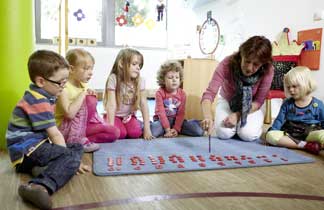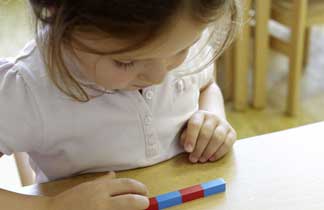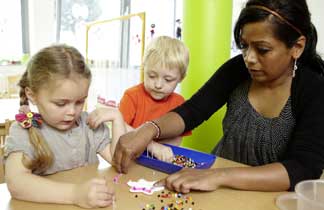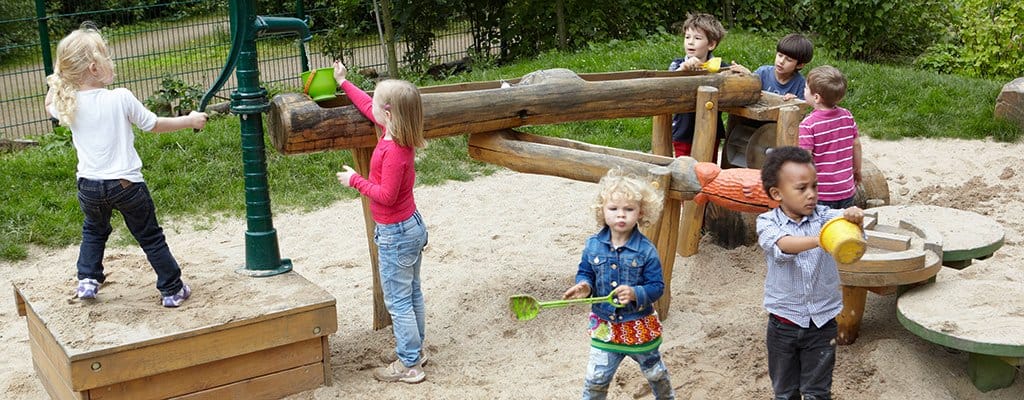
PHILOSOPHY & TEACHING
The first 6 years are a crucial time in a child’s development. In this decisive period, it is our mission to give children the space and attention they need for their individual development.
We want to intellectually, emotionally and socially prepare children for the many demands the 21st century will place on them. Teaching very young children traditional art and music skills from our cultural heritage plays an important role.
All children have their own gifts. We want to help each child discover their strengths, nurture them and help them blossom. And at the same time, we want to identify possible weak points and help each child individually. Still, we always keep in mind forget that children get to be children.
In today’s society, diversity and being different have become normality. A central aspect of our childcare, one that we hold very dear, consists of modelling and teaching how to treat one another with respect and fostering participation and tolerance.
We employ a wide range of pedagogical approaches to meet the children’s individual needs. To name a few: Montessori, situation-based approach, project-related work. We reflect on these regularly in our teams and restructure them according to the needs of the children.
WHAT DO CHILDREN NEED?
We got in touch with primary schools and asked them: “As kindergartens, what can we do to make it easier for children to start school and help them handle the new situation as a school child?”
The unanimous response we received was not concerned with learning letters, numbers, writing, counting or reading at an early age. Instead, teachers wanted us to lay the necessary groundwork for successful learning. The OECD Programme for International Student Assessment (PISA) study showed a similar concern.
These things require special attention:
- Social skills
- Tenacity
- Ability to concentrate
- Age-appropriate motor skills
- Listening skills
Ideally, children should have acquired the soft skills needed to make subject-based learning possible by the time they start school. Yet, they much too rarely show a willingness to delay gratification.
This includes:
-
- Respecting the opinions of others and not passing judgement
- Waiting your turn to talk in class
- Being able to concentrate on one task for a longer period of time
- Coping if something does not work out right away without becoming angry at yourself or others
- Finding solutions by yourself and not uncritically accepting the answer provided as the only approach



POSSIBLE EXPLANATIONS FOR THE LACK OF THESE SKILLS
These hypotheses could be used to explain some of shortcomings:
“Present-day society is a consumer society.”
We buy products and services. Our everyday lifes no longer prominently feature processes as they once used to, for instance how to turn flour into bread. Now, we spend more time thinking about where to buy which service at a certain price than we do thinking about how to make or provide that service ourselves and what that would take.
The product becomes more valuable than the process that creates it. We seek immediate gratification – quickly reaching our goals takes priority over the satisfaction we would derive from watching a product being created and seeing its place in the big picture.
“Our society has changed!”
There is no need to make this positive or negative. What matters is how to compensate for social change in a way that lets our children acquire process-based learning techniques to help them master school and the rest of their life.
Day-care centres are not immune to the pressure. Parents want teachers and staff to deliver visible, measurable achievements. In normal kindergartens, larger group sizes and lower staffing levels no longer allow real process-based work. They are forced to focus on activities that can be achieved in these large groups and with less effort, meaning that children learn things that lead to quick results.
Reading, writing or arithmetic demand perseverance and patience to be acquired properly. Many children are used to seeing quick results which makes learning your numbers and letters a tedious chore. Teachers are constantly straining to keep children’s spirits up and their attention trained on the task at hand.
Consequently, learning facts and figures is not something we focus on. First, children need to acquire learning skills.
HOW DO WE HELP OUR CHILDREN INTERNALISE THE LEARNING PROCESS?
Infants/Toddlers
Creating spaces that encourage them to explore
Our gestures, faces and language encourage their exploring. Our interest makes their actions worthwhile.
Children this young can only classify the world to a certain extent by what they see. They need to handle what they see to try to understand it. This brings forth different reactions from those around them, some positive and some negative.
But why? It is often not yet possible to use just your words to help such small children understand the difference. As a result, children come to associate reaching for things with getting a reaction from those around them, with experiencing signals of approval or disapproval. Too much negative reinforcement can limits children’s urge to explore.
We cannot let them do everything, but we can make the children’s world as safe as possible to explore which will preserve their inquisitive mindset.
Kindergarteners and schoolchildren
It’s all in the mix
We offer projects
- that consist of activities leading to quick results. This bolsters the children’s self-esteem and encourages them to try out new things.
- that do not lead to visible/tangible results, and instead focus on transferring knowledge and feeding their natural curiosity.
- that require a lengthy learning process to achieve results.
This mix can be achieved in all areas of art, music, science, languages, exercise and nutrition.
We have to consider individual preferences, strengths and weaknesses, which is only possible in small groups. The quiet surroundings of small groups mean that children and teachers alike can observe, provide support and pay attention to smaller details.
The number of employees and their quality are key factors. We employ highly qualified professionals who usually bring additional skills to the table that we can make available to all children at the day-care centre, irrespective of group structures.
Babies and toddlers take part in activities within their group: Children this small need a sheltered, familiar framework to flourish. Keeping a close eye on each child’s developmental stage and needs, we slowly increase their contact with other groups. This is an important process in the children’s development towards more independence.

WHY GROUPS ARE IMPORTANT
Problematic social behaviour has become an issue at schools, as previously noted. Groups are the only place where children can learn and practise how to make decisions and exercise tolerance:
- Who do I want to play with?
- Who do I like, and who do I not like?
- How do I take other children’s needs into account, and how do I stand up for my own needs?
- How do I get along in a group, and how do I find my bearings?
We are dedicated to taking the holistic view of every child in our care! Between the age of 0 and 6, children take the most important steps in their personal development. Only a holistic approach to children lets us make use of this period to prepare them intellectually, emotionally and socially for the many challenges of the 21st century. Never forget:
A good start lasts a lifetime.
At our Villa Luna child day-care centres, we have the staff, room and equipment to give your children the best start possible!


